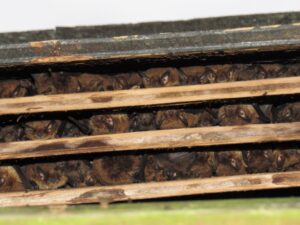
Photo Neil Boyle
Vancouver, BC: For 40 years, the Habitat Conservation Trust Foundation (HCTF) has helped fund conservation groups, government, Indigenous Nations, and local communities to implement projects that protect B.C.’s wildlife, freshwater fish, and the habitats they need to survive and thrive. This year, HCTF awarded $9.3 million in funding for 175 individual conservation projects throughout British Columbia.
HCTF’s CEO Dan Buffett is pleased to report that the 2021/22 grant season represents the Foundation’s highest record annual investment and reflects the financial contributions and hard work of many British Columbians that fund and implement these projects. To date, HCTF has funded 3,230 conservation projects and granted over $195 million in funds across the length and breadth of this ecologically diverse province.
One such project lead by the British Columbia Conservation Foundation is Got Bats? BC Community Bat Program. The program, which received $77,237 in funding from HCTF and the Forest Enhancement Society of BC (FESBC), encourages B.C. residents to value, protect, and monitor bats. Bats play an integral part in many environments, keep down the number of biting insects, and strengthen and improve overall ecosystem health. The B.C. wide network of programs aim to raise awareness of threats to bats, protect, monitor and install bat roosting sites and provide guidance and support for developing a local Bat-friendly Community approach to bat conservation.
Richmond and Delta are recognized as two of the four certified “Bat-friendly” communities in B.C. By engaging and educating the public about bats, Got Bats? strives to secure these important species for generations to come.
“The program is particularly important in the face of white-nose syndrome, a fatal bat disease that is spreading across North America and is currently less than 150 km from the Lower Mainland and southern Vancouver Island,” said Got Bats? Provincial Coordinator, Mandy Kellner. “Our goal is to promote conservation of bats on private land through education and outreach, landowner contact, and promoting citizen science involvement in disease surveillance and the B.C. Annual Bat Count.”

Installing A Bat Box -Photo V. Reznice 
New Bat Boxes – Photo Danielle Dagenais 
Bats in Box – Photo BC Community Bat Program
Other HCTF funded projects taking place in Vancouver and the Lower Mainland include:
- $80,000 to support urgent work to re-establish a fish passage in the face of a Rockslide along the Seymour River before salmon return in access their spawning grounds.
- $22,000 for native plant landscaping and bird habitat restoration in Vancouver with the Environmental Youth Alliance and 50 local community organizations and schools.
- $65,000 to evaluate Northern Goshawk breeding success in coastal and transitional forests.
- $79,000 for research to identify and confirm critical habitat for juvenile White Sturgeon along the Pitt River.
- $30,000 to enhance 1,295 hectares (3,200 acres) of upland agricultural habitat in the Fraser River estuary for bird species, in partnership with farmers in the cities of Delta and Richmond.
Funding and support for these projects and others across the province come from a wide variety of sources including public groups such as the British Columbia Wildlife Federation (BCWF), partner organizations like the Forest Enhancement Society of BC, provincial government contributions, court fines, and endowments. A significant source of funding comes from the conservation surcharge paid by B.C.’s anglers, hunters, trappers, and guide outfitters.
“Over 40 years ago, a group of concerned hunters and anglers, now represented by B.C. Wildlife Federation, lobbied for a surcharge on hunting and fishing licenses to fund wildlife and fish habitat improvement projects throughout the province,” said BCWF president Chuck Zuckerman. “The result of this impassioned call from B.C.’s hunters, anglers, trappers and sport shooters formed a new fund in 1981 that subsequently evolved into the Habitat Conservation Trust Foundation.”
Steve Kozuki, executive director of FESBC, has been pleased to be a partner with HCTF.
“We are proud to partner with HCTF and local experts on the ground throughout British Columbia to improve wildlife habitat,” said Kozuki. “HCTF combines wildlife biology expertise with their excellent management of funds to deliver outstanding benefits for wildlife. With all the pressures on the land base, the good work HCTF does is more important than ever.”
Each project funded by HCTF goes through a multi-level, objective and technical review process prior to final Board review and decision. HCTF’s Board of Directors ensure that species important to B.C. anglers and hunters are supported but also place a great deal of importance on conserving whole ecosystems, species-at-risk, and investing in environmental education across the province.
To see the complete list of HCTF funded projects or explore the conservation work being done near you, view the 2021-22 Approved Project List.
For interviews:
Habitat Conservation Trust Foundation
Craig Doucette, Communications Officer |
Direct: 250 940 3012 | Toll-free: 1 800 387 9853 ext. 212 | Craig.Doucette@hctf.ca
Forest Enhancement Society of BC
Aleece Laird, Communications Liaison
Direct: 250 574 0221 | communications@fesbc.ca
 HCTF Quick Facts
HCTF Quick Facts
It is the mission of HCTF to improve the conservation outcomes of B.C.’s fish and wildlife, and the habitats in which they live. We make a difference by funding conservation projects and by educating and engaging the public about B.C.’s natural assets. 2021 marks HCTF’s 40th anniversary of helping conservation groups and individuals secure funding for conservation projects and providing education to the general public about B.C.’s important natural assets. Since 1981, HCTF has provided over $195 million in grants for 3,230 conservation projects across B.C. HCTF began as an initiative by B.C. anglers, hunters, trappers, and guide outfitters.
